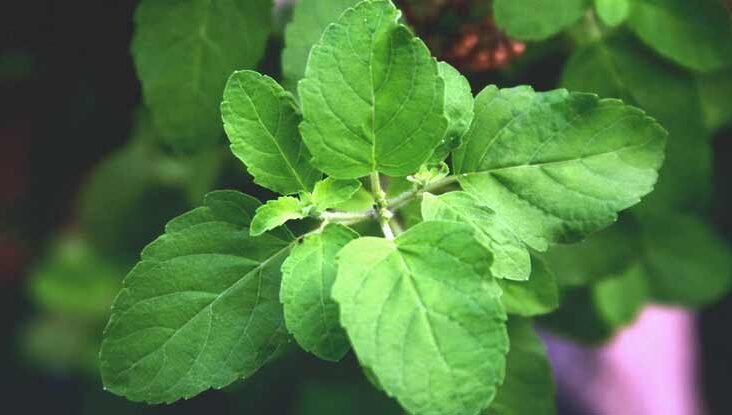“Tulsi” – The Holy Basil leaves and serenity in the garden. There cannot be a single Indian who doesn’t know about Tulsi leaves. Not even Indians, people outside also consume Tulasi, or Basil goes in their daily life. But can we chew tulsi leaves? Using Tulsi leaves in tea or kadha is recommended because of its medical properties. Here, we will look at why we should avoid eating tulsi leaves.
What do Scriptures Say About Eating Tulsi Leaves?
My mother told me a story about Tulasi Vivah. According to the Padma Purana, the Tulasi plant was a female named “Vrinda.” She got married to Jalandhar the Evil or Asura king. He was known to be the most powerful king for his devotion and modesty towards Lord Vishnu. So, all the Devtas requested Trinity God – Lord Vishnu to provide a solution. On the day of battle, Vrinda asked Jalandhar to take a Sankalpa of his victory. But, when she got to know that Lord Vishnu concealed himself as Jalandhar. Then, she left her Sankalpa and touched his feet before he left for war.
So, we can say Tulasi is God Vishnu’s wife, and chewing tulsi leaves will be disrespectful. The story further goes that she loses her temper and curses Lord Vishnu to become Shaligram and separation from his wife, goddess Lakshmi. Vrinda drowned herself in the ocean, and Lords transmit her soul to a plant known as Tulasi. Vishnu Ji also gave a blessing to Vrinda that he will marry Vrinda in his next birth. In the form of Shaligram (a black stone) and Tulasi that too on Prabodhini Ekadashi.
What do Botanists have to say?
Botanists developed research reports stating that Tulsi leaves have a high amount of mercury in her leaves. And, to be precise, consuming this amount of mercury directly by teeth makes them weaker and causes weakness for the teeth. Although the side effects might not be visible immediately. But, indeed, it will damage your teeth with such a high amount of mercury in the future. So, try not to chew Tulasi leaves to keep your chewing instrument safe.
Harmful Acid in Tulsi Leaves
Researchers come up with another reason that Tulasi Leaves have a small amount of harmful acid. In contrast, we all know that our mouth has an alkaline medium. If the acid enters the mouth, then it can react and can cause tooth decay issues. So, it is highly recommendable not to consume these leaves directly.
Discolouration Issues
As per scientific research, Tulasi has a high amount of iron in its leaves. And, iron is considered being a powerful element that can cause discolouration. Discolouration cannot be caused if you are eating tulsi leaves often. If you are chewing it regularly, you can observe that your teeth are getting discolored. In short, if your teeth start looking yellow or little brown, then stop chewing Tulasi leaves.
Best Way to Consume Tulasi Leaves
Holy Basil or Tulsi leaves are used for healing various medical issues. By consuming its leaves, you can cure a common cold, kidney stones, insect repellent, respiratory disease, etc. So, instead of eating Tulsi leaves, you can swallow them. You can also use these leaves as a herbal remedy for making your immune system more energetic and active.
Are you a tea lover? Just add these amazing leaves to your green tea or traditional tea with other spices like cloves, cardamon, etc. Even nowadays, people include Tulasi-infused ghee in their diets. Moreover, you can have juice. You have to blend some basil leaves with a cup of water with a little dash of honey. Afterwards, strain it and pour it in a glass and Enjoy…








